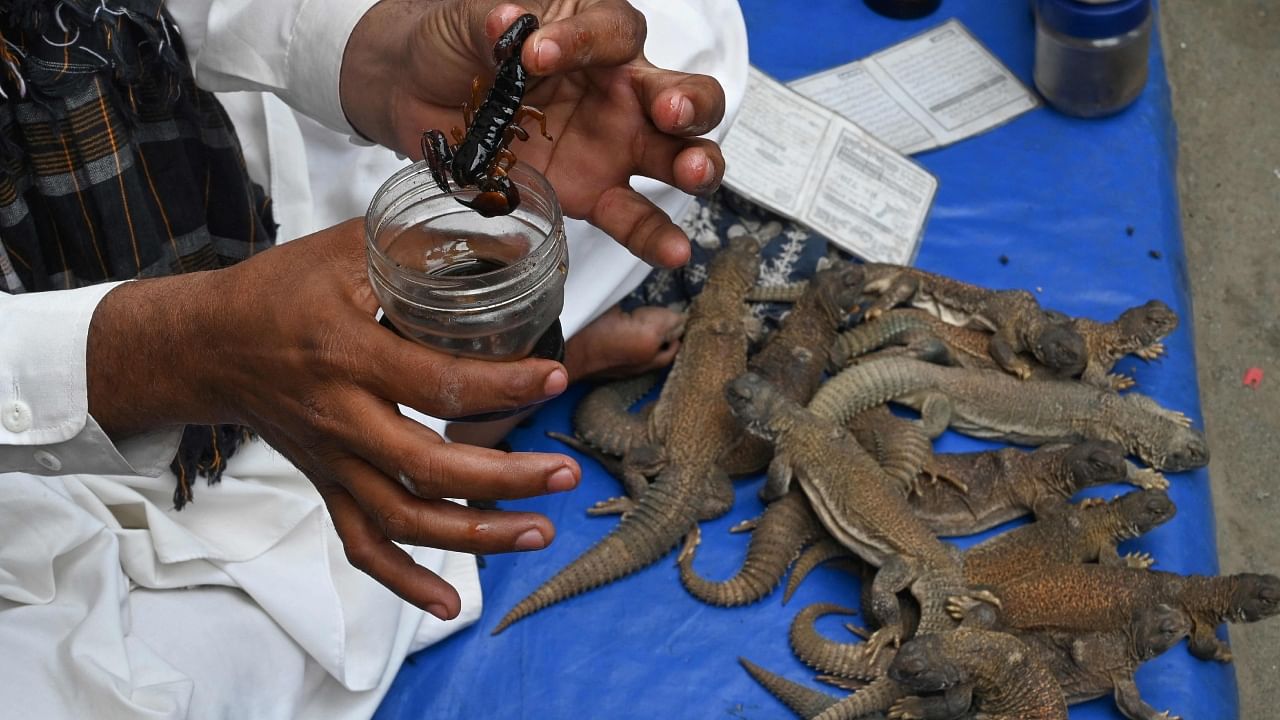
In a clamorous bazaar, hot-blooded Pakistani men seek a cold-blooded cure for their sexual ills -- freshly rendered lizard fat, marinated in scorpion oil and garnished with filaments of a fiery red spice.
Unsurprisingly, the black market balm known as "sanda tael" -- cola-coloured, with the whiff of burnt frying pan -- has absolutely no scientific backing.
It also relies on poaching the reclusive Hardwicke's spiny-tailed lizard, which is cruelly butchered on the pavement before its innards are cooked on a crude gas hob.
"You just apply five drops over the affected area and massage," said Yasir Ali, one of four vendors in Rawalpindi's Raja Bazaar.
Also Read: Pakistan confirms its first case of mpox
"It does magic in terms of promoting sexual stamina," the 40-year-old told AFP.
As he speaks, a lounge of paralysed lizards is spread out on his tarpaulin sheet cluttered with glass vials.
Ali entices a gaggle of customers perusing his potions by telling them it is "a solution to bring joy and happiness" which will make them "strong like steel".
"It will make your wife happy," he promises with a glint in his eye. "Buy it and try it."
Sultan Mehmood, 62, a user for three decades says it "works like a miracle", as he launches into a vivid description of his sexual performance.
The meek lizards -- measuring up to 60 centimetres (24 inches) as adults -- are plucked from the plains of Punjab and Sindh provinces as they peep out of their burrows to sunbathe.
As night fades, Muhammad Nasir, 25, lays a web of fishing wire snares on the arid plateaus surrounding the village of Adiala, 20 kilometres (12 miles) south of Islamabad. Within hours he has caught more than a dozen.
"We break the lizards' back after capturing them," the fourth-generation poacher said. "This is done to make sure they don't run away, because the animal moves with the speed of a bullet."
"Sometimes it's quite painful to hunt these lizards and deprive them of their right to live in a natural habitat, but this is how we make a living."
In a nation where social pressure dictates couples produce sprawling families, infertility is deeply stigmatised and Viagra is outlawed, the quack remedy for sexual impotence remains popular.
But Islamabad clinician Ahmad Shahab says the trade is capitalising on naivety stemming from the taboo of sexuality in deeply conservative Pakistan.
"It is absolutely rubbish and there is no truth in claims that the oil helps," Shahab said.
"Sex is a subject people are quite curious about and these quacks are making fools out of them," he added.
"We have to change the mindset of our people and to educate them."
WWF senior research and conservation manager Jamshed Iqbal Chaudhry agreed claims of healing properties are "totally false and devoid of any truth".
The International Union for Conservation of Nature classes the spiny-tailed lizards as "vulnerable".
"The over-exploitation of lizards will lead them to the verge of extinction," Chaudhry warned.
Ali, the vendor, says he has been arrested "many times" by wildlife protection officers, but after fines no larger than 10,000 rupees ($35) he was freed to continue his trade.
Ali cuts the sand-coloured lizards' necks while they are immobilised but alive -- ending their 15-year lifespan -- and melts down the fat inside their plump bellies.
He says the unction is infused with saffron -- an exorbitantly expensive spice -- but given the oil sells for between 600 and 1,200 rupees ($2 to $4) that seems unlikely.
He also claims its miracle properties include healing joint aches, back pain, sciatica and hair loss.
"I have regular customers from Saudi Arabia, Dubai, Sharjah, Malaysia and several African countries," he boasts.
Muhammad Azam, 65, remains unconvinced.
"It's nothing but a fraudulent activity," he said. "I used this medicine but found it useless. It's full of germs and bacteria."
Still, Ali's fellow vendor Muhammad Rafiq, 40, says others turn to the oil "to satisfy their wives and to have children".
"This is a great human desire which is undeniable," he said.